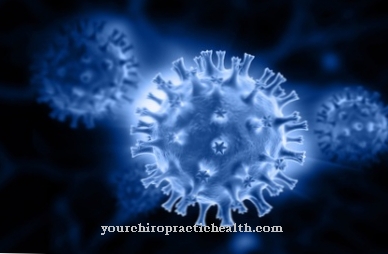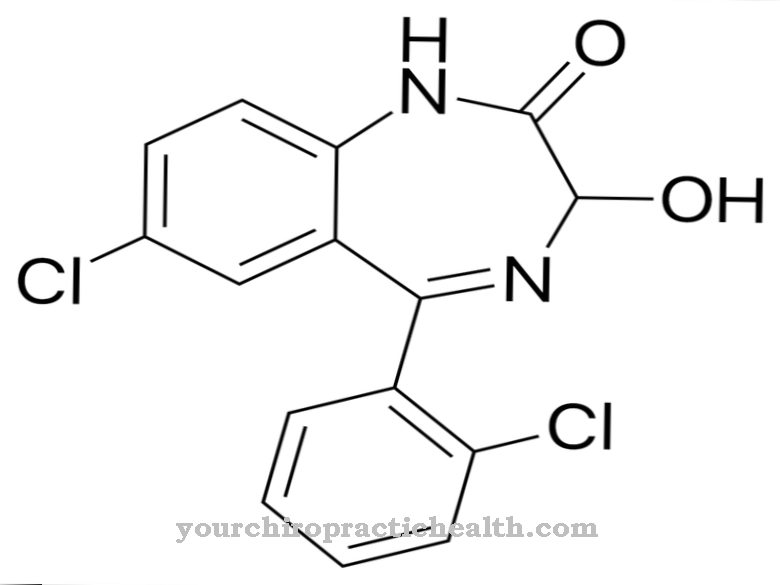Diosgenin is a so-called phytohormone, which occurs particularly in the yam root. A variety of beneficial effects of diosgenin have been found in humans. Due to its structure similar to the steroid hormones in humans, it is also used for the synthesis of sex hormones and cortisone.
What is Diosgenin?

Diosgenin is an active ingredient in plants that is similar to steroid hormones in humans due to its chemical structure. The yam root in particular contains a lot of diosgenin. The active ingredient is the aglycone of dioscine. An aglycon is a non-sugar component which, instead of a glycosyl group, binds a hydrogen atom at the appropriate point.
The basic chemical structure shows the same steroid structure that the human sex hormones and the glucocorticoids (cortisone) contain. Therefore, diosgenin can also be chemically converted into cortisone and progesterone.
Cortisone is the typical glucocorticoid, which is used in many ways to treat allergies, autoimmune diseases and in organ transplants to prevent rejection reactions. Various derivatives of diosgenin are used in medical research. Active ingredients are sought that have similar or even better properties than diosgenin.
As an active ingredient, it is administered through dietary supplements. The medical importance for classical medicine results from the fact that it serves as a starting material for the synthesis of important hormones and contraceptives. The pharmacological spectrum of activity is very diverse, so that it plays a major role in the therapeutic treatment of health impairments.
Pharmacological effect
Diosgenin is not an endogenous substance, but a herbal active ingredient that has positive effects on the human endocrine system. The herbal active ingredient from the yam root has a similar structure to the steroid hormones in the human body. How diosgenin works in the human body is not yet fully understood. It is thought to be responsible for the increased production of the hormone dehydroepiandrosterone (DHEA). DHEA slows down the aging process and works against bone loss.
In a special way, the active ingredient also intervenes in the hormone metabolism in the treatment of menopausal symptoms. It has been observed that there is a reduction in hot flashes and even an increase in sexual pleasure in women going through menopause. In men, for example, prostate problems could also be reduced.
Diosgenin also has an anti-carcinogenic effect, as has been proven in animal experiments on rats. The risk of developing colon or prostate cancer decreases with the administration of diosgenin. Diosgenin also has an antimicrobial effect against the yeasts Candida albicans and Candida glabrata. A certain effectiveness was also found against the hepatitis C virus.
Tests have also shown that diosgenin can inhibit blood coagulation for a long time and is therefore effective against the formation of thrombosis. Diosgenin also has an inhibitory effect on acetylcholinesterase. It is not yet used in this regard, but further studies are being carried out to clarify possible uses in diseases associated with increased acetylcholinesterase activity.
Finally, an anti-inflammatory effect of diosgenin has also been observed. Overall, many positive effects of Diosgenin have been demonstrated in experiments and studies, although the exact mechanism of action is not yet known.
Medical application & use
Diosgenin is a plant hormone and occurs particularly in the yam root. The yam root was used in folk medicine early on by the Aztecs, Mayas, North American Indians and the Chinese. It was there that its beneficial effects on inflammation and rheumatic diseases were recognized. The range of effects is very broad.
Typical age-related diseases such as arteriosclerosis or cardiovascular diseases are also less common when the yams are consumed frequently. At the same time, it has a positive effect on hypothyroidism, diabetes, muscle cramps, urinary tract diseases, digestive disorders and biliary tract disorders. The yam root was also used for contraception.
For application in classical medicine, diosgenin is initially used as a raw material for the production of progesterone and cortisone. In medicinal medicine, the use of diosgenin is based on the use of diosgenin-containing plants such as the yam root. There it is used in the form of food supplements (capsules or powder), ointments and creams.
Risks & side effects
So far, diosgenin has not been used in its pure form, but only in connection with the vegetable raw materials such as yams. Usually positive effects are registered. Even when side effects are mentioned, they are usually positive side effects. For example, the use of yam root preparations has been found to have a rejuvenating effect on the skin.
Occasionally, however, there are also unpleasant side effects. If the dose is set too high for a long time, it can lead to reddening of the skin and tiredness. Digestive problems are also reported, but only if the affected person had frequent stomach and intestinal problems before.
Everyone reacts differently to certain drug concentrations, so that there is still no clear picture of where the dangerous drug concentration is. The yam root does contain high concentrations of diosgenin, but it does not seem to have any particular side effects when used.
As a precaution, however, there are contraindications for the yam root. It should not be used for menstrual problems in girls during puberty. Puberty is a time of very strong hormonal change processes, so that an additional intake of hormone-like substances may have unforeseeable consequences. Since too little is known about the hormonal effects of diosgenin, the yam should not be used in cervical cancer either.
























.jpg)



